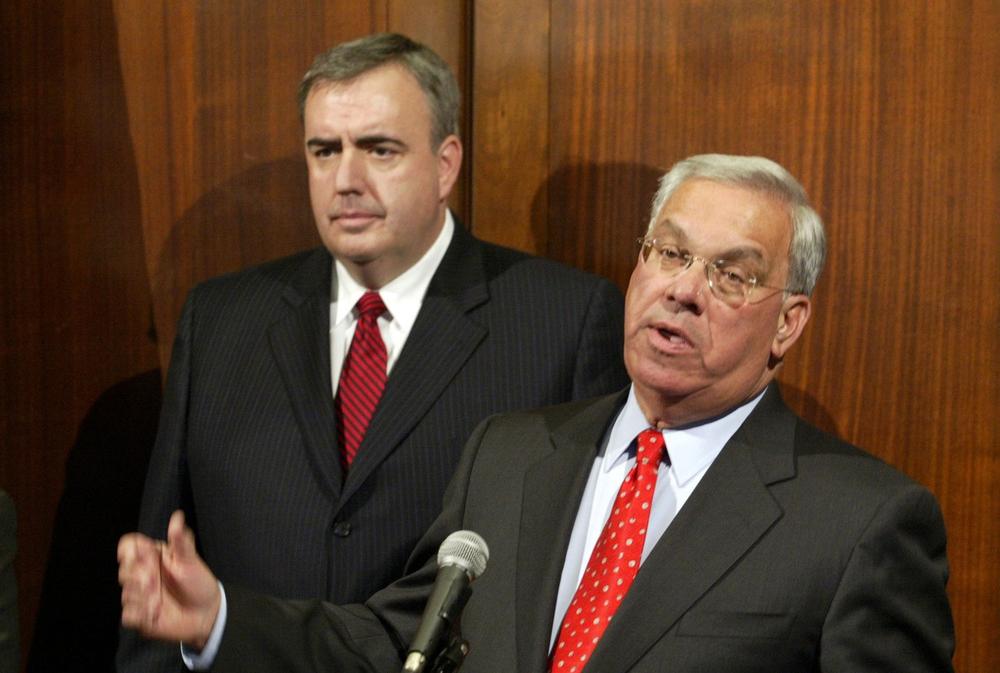Advertisement
Crime In Boston May Be Down, But Concern Is Still High
ResumeWhen Boston's mayoral candidates hold their first debate Wednesday night, they are expected to talk about schools, development and public safety. Incumbent Mayor Thomas Menino will likely tout the latest crime statistics, which show that violent crime is down about 7 percent since last year. But violent crime is still a top concern for many residents.
The homicide rate has not gone down in Boston's Grove Hall. The Roxbury-Dorchester neighborhood has been the scene of eight homicides so far this year, the same number as last year.
That worries Timothy Biggs. He is sitting outside his family's barbershop on Blue Hill Avenue, where he has lived all his life, and says violence has only gotten worse.
"Crime is always a concern," says Biggs, who has a 15-year-old daughter. "She went out to the store, and someone stole her bike. Her cousin went out, and some guys jumped him. He is 12, and they beat him up. You can't walk the streets around here because children aren't being governed. They aren't being taught."
And Biggs says he does not trust the police to help.

"In these neighborhoods — Dorchester, Roxbury, Mattapan — everybody gets stopped or snatched up by the police for one reason or another," he says. "It's not like the police don't know who the criminals are. They know who the criminals are. They should go and get them. That would decrease crime."
Jorge Martinez has similar complaints about the Boston Police Department, even though he has what he describes as a "close working relationship" with the BPD. Martinez runs Project RIGHT, a community organization in Grove Hall.
He describes a series of what he calls "dysfunctional" police initiatives over the Menino years, some of which never went very far. He points to one program started last year encouraging parents to allow cops to search their homes for guns without a warrant.
"They have very good intentions. It's not like they hate people, or they hate young people," Martinez says. "But their strategy's not going to work here. We're very vocal and we're very proud. And we like to be part of the solution."
City Councilor Chuck Turner, who has represented Roxbury for nearly 10 years, calls the police department one of the worst-run parts of Menino's administration. "The reality is that Mayor Menino runs the police department, and people have concerns about public safety policy," he says.
Turner recently did a study of homicides, and found that over the last decade, 342 murders have gone unsolved. That is 55 percent without an arrest.
"When a murder does take place, the public has a right to expect the police department to solve that murder, with the assumption that the more you solve the murders, the more you take people off the streets who are using violence as a source of control and power, which is important," Turner says, "but I think the Boston Police Department doesn't do that."
The Boston Police Department says it has beefed up its homicide unit and that is showing good results. This year, they have solved 50 percent of homicides, up from 30 percent a few years ago. The national average is 61 percent.
Mayor Menino says the officers are using the latest technology and strategies to police Boston.
"Every few years you change your techniques," Menino says. "Crime is down in Boston. That's the proof of the work that's going on in Boston. We're not perfect. But we're working hard with the community. That's the community and the police working together."
But Menino's mayoral challengers say the police could work better with the community. No one is promising to lower crime rates drastically, but at least one candidate says he will change the way cops interact with residents.
City Councilor Sam Yoon wants the police department to focus more on what he calls "customer service." He also wants to completely restructure the department, which he says has not changed in more than 30 years.
"It's high time we re-examine the way we do things in law enforcement and public safety and say what works and what isn't working," Yoon says. "And have the courage and, hopefully, through an election, have a mandate from taxpayers and residents to reform the system."
Yoon says he would start an independent civilian review board that has the power to investigate police conduct and review policies and strategies.
City Councilor Michael Flaherty, on the other hand, is proposing to get residents more involved in crime-fighting, with something he calls e-policing. He wants the department to notify residents by e-mail or text message when there has been a crime in their area.
"We want to partner," Flaherty says. "And one of the ways we partner is we open up the lines of communication to let residents know what's happening in their neighborhood so they can look out for suspicious activities."
Flaherty also says he would hire more street workers and place them in schools.
Developer and mayoral candidate Kevin McCrea says he would increase the number of cops on the street and improve technology for modeling crime patterns.
McCrea and the other candidates said the department — especially its managers — needs to look more like the community it polices. According to BPD statistics, 82 percent of supervisors in the department are white, while the community is about 50 percent black, Latino and Asian.
That imbalance is something the Boston Police Department, under Mayor Menin0, agreed to address just weeks ago.
This program aired on September 2, 2009.